1. Early Life and Education
Ichikawa Fusae was born on May 15, 1893, in Meichi Village, Nakashima District, Aichi Prefecture, Japan, an area that is now part of Ichinomiya City. She was the third daughter among six children in a farming family. Her father, Fujikuro, born in 1848, was a farmer who at one point engaged in commerce, but was known for his violent behavior. Her mother, Tatsu, born in 1859, came from a neighboring farming village and married Fujikuro at the age of 19. Despite his abusive nature, her father was keen on education, ensuring her eldest brother became a teacher, studied in Tokyo, and later went to a university in the United States. Her eldest sister attended a women's normal school in Nara Prefecture, and her youngest sister studied at Shiga Girls' School before moving to the U.S. and marrying a Japanese American.
Ichikawa attended Meichi Jinjo Elementary School before enrolling in Seihokubu Higher Elementary School in April 1903. She later transferred to Asahi Jinjo Higher Elementary School when it was established in her village. After failing an entrance exam for Miwada Higher Girls' School in Tokyo, she returned home and began working as a substitute teacher at Hagiwara Jinjo Elementary School in September 1908. She obtained a junior elementary school teacher's license on January 27, 1909.
In April 1909, Ichikawa enrolled in the women's department of the Aichi Second Normal School in Okazaki Town (now Okazaki City). Normal schools at the time provided free tuition and boarding, along with clothing allowances, in exchange for a five-year commitment to teach in elementary schools within the prefecture after graduation. This made them highly desirable for young women seeking independent professions. She spent three years in Okazaki, where she excelled in tennis, winning a match against the Okazaki Town Girls' High School.
In April 1912, she transferred to the newly established Aichi Women's Normal School in Kinjo Village, Nishikasugai District (now Tenjin-yama-cho, Nishi Ward, Nagoya). In July of the same year, she led a student strike with 28 classmates, submitting 28 demands in protest against the new principal's emphasis on "good wife, wise mother" education. Ichikawa graduated in 1913, becoming a member of the school's first graduating class. In April 1913, she was appointed a teacher at her alma mater, Asahi Jinjo Higher Elementary School, and then transferred to Nagoya's Second Higher Elementary School in April 1914.
2. Early Activism and Formation of Feminist Organizations
In March 1917, Ichikawa resigned from her teaching position due to illness. Through Kobayashi Kitsugawa, a cultural figure she knew, she joined the Nagoya Newspaper (now Chunichi Shimbun) on July 10, 1917, becoming its first female reporter among over a dozen male journalists. She left the newspaper in August 1918 and moved to Tokyo, where she became more deeply exposed to the burgeoning women's movement.
2.1. New Women's Association
In 1919, Ichikawa co-founded the New Women's Association (新婦人協会Shin-fujin kyokaiJapanese) with pioneering Japanese feminist Hiratsuka Raicho. This organization marked a significant turning point as the first Japanese group explicitly formed to improve the status and welfare of women. Under Ichikawa's leadership, the association campaigned for changes to Japanese laws that prohibited women's political participation, notably Article 5 of the Public Order and Police Law. Since women were legally barred from engaging in direct political campaigns, the organization ingeniously held "lecture meetings" to circumvent the law and advance their objectives. Their relentless efforts ultimately led to the overturning of this prohibitive law by the Imperial Diet in 1922. Following this success, the New Women's Association disbanded.


2.2. Women's Suffrage League of Japan
Two years later, in July 1921, Ichikawa traveled to the United States as a special correspondent for the Yomiuri Shimbun. While there, she immersed herself in the American women's and labor movements, studying their strategies and meeting prominent figures such as Alice Paul and Carrie Chapman Catt.
Upon her return to Japan in January 1924, she began working for the Tokyo branch office of the International Labour Organization (ILO), where she conducted investigations into issues like women's night labor until her resignation in 1927. On December 13, 1924, she founded Japan's first organization specifically dedicated to women's suffrage, initially named the "Association for the Promotion of Women's Suffrage" (Fujin Sanseiken Kakutoku Kisei Domeikai). Following the establishment of universal male suffrage in 1925, the association was renamed the Women's Suffrage League of Japan (日本婦人有権者同盟Nippon fujin yûkensha dômeiJapanese), also known as Fusen Kakutoku Domei.
The League, working closely with figures like Shigeri Yamataka, who later served in the House of Councillors, continued to press the government and parliament for women's suffrage. In 1930, it hosted the country's first national convention focused on women's enfranchisement. Although a bill granting women full civic rights passed the House of Representatives that same year, it was ultimately defeated by the House of Peers. Beyond suffrage, Ichikawa also engaged in various social movements aimed at protecting mothers and children and defending livelihoods. Around 1937, she served as a trustee for the Tokyo Women's Hall.
3. Women's Suffrage
Ichikawa's unwavering commitment to women's suffrage was central to her life's work. Her persistent advocacy played a crucial role in paving the way for the enfranchisement of women in Japan.
During the post-World War II occupation period, Ichikawa was a significant figure in ensuring that women's suffrage was included in Japan's new postwar constitution. She argued passionately that the political empowerment of women might have served as a preventative measure, potentially averting Japan's entry into such a devastating war. On November 3, 1945, in the immediate aftermath of the war, she established the New Japan Women's League (新日本婦人同盟Shin-Nippon Fujin DomeiJapanese), an organization explicitly dedicated to securing women's right to vote, and she was appointed its first president.
Her tireless efforts, combined with the mandates of the Potsdam Declaration, ultimately led to the granting of full suffrage to women in Japan in November 1945. This historic achievement was further codified with the revision of the House of Representatives Election Law on December 17, 1945, which officially established universal suffrage for both men and women. In the general election held on April 10, 1946, 39 women were elected to the Diet. Although Ichikawa herself did not run in this election and was unable to vote due to a registration oversight, she recognized the critical need for women to actively participate in politics. To foster this, she established the "Women's Suffrage Hall" (婦選会館Fusen KaikanJapanese) in Yoyogi, Shibuya, in December 1946, serving as a center for political enlightenment and education for women.
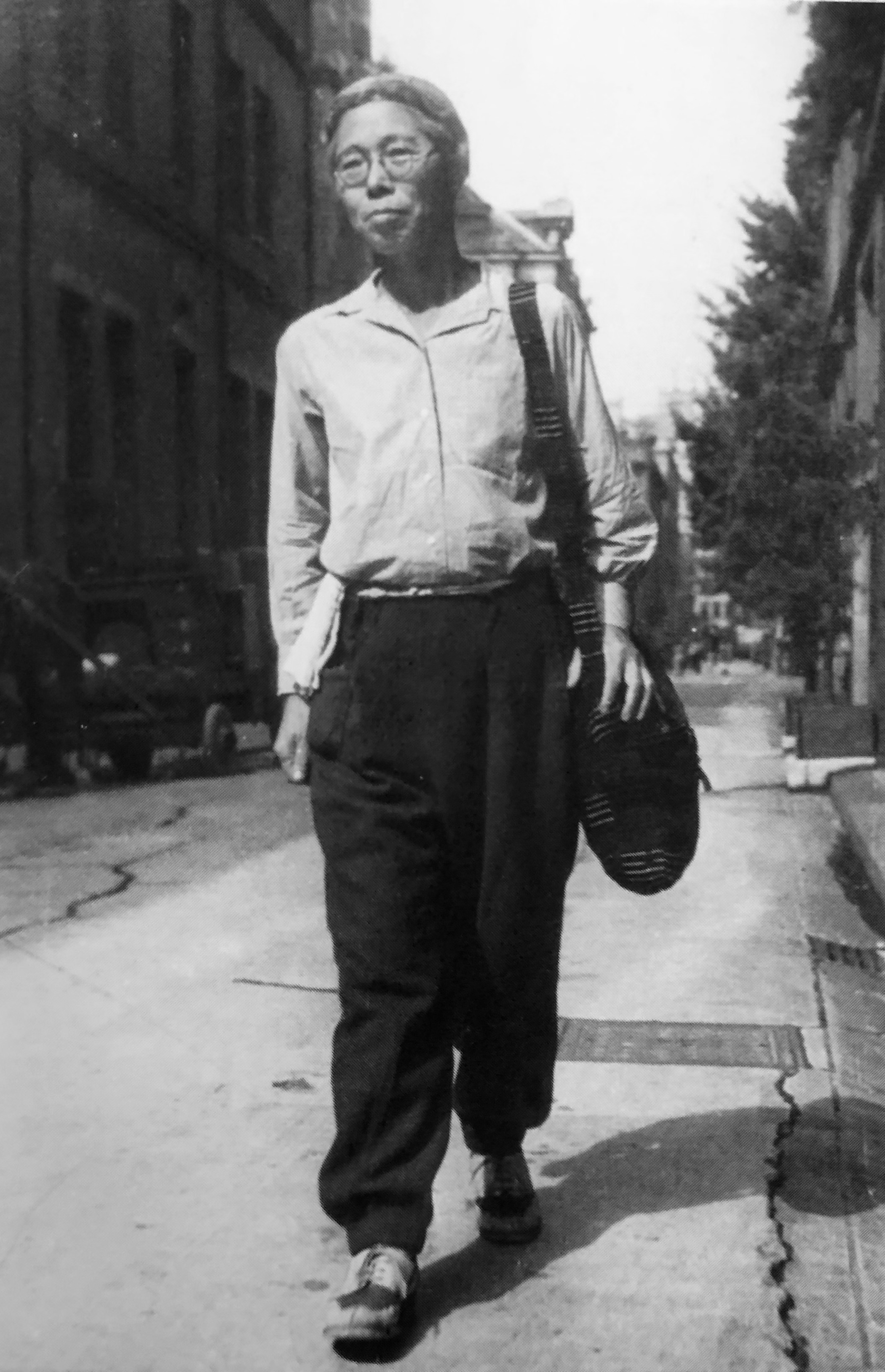
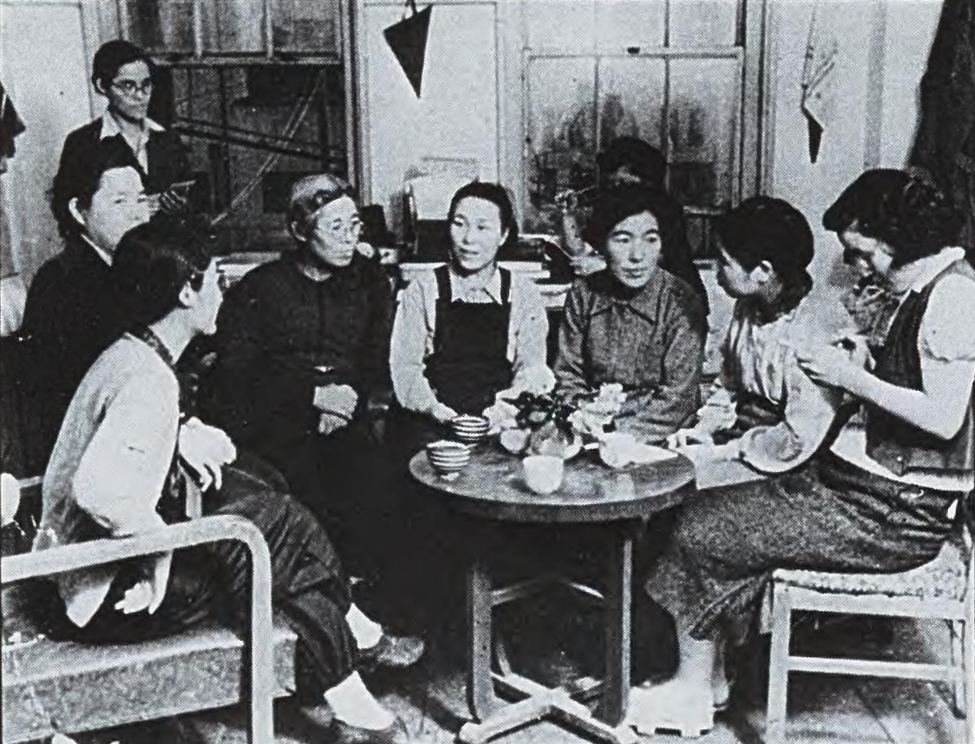
4. Other Social and Political Engagements
Ichikawa Fusae's activism extended far beyond the women's suffrage movement, encompassing a wide array of social reforms and political issues aimed at strengthening democracy and social justice in Japan.
4.1. Electoral Reform and Clean Politics
Ichikawa was deeply concerned with the integrity of democratic processes, particularly the issue of election corruption. In 1933, her efforts to combat such corruption led to the establishment of the Women's Association to Clean Tokyo Politics. Her dedication to clean elections also resulted in her appointment as one of five female trustees in an official government body, the Central Association to Clean Up Elections. Throughout her political career, she championed an "ideal election" campaigning style, characterized by a reliance on personal supporters rather than large organizations or significant financial expenditure. She advocated for other candidates to adopt this method, believing it would lead to a more equitable and democratic electoral system. However, this approach was sometimes criticized, notably by Daizaburo Hashizume, who argued that such low-cost campaigns were only feasible for already famous individuals like Ichikawa and therefore did not offer a practical systemic reform for broader political participation.
4.2. Wartime Involvement and Controversies
During World War II, Ichikawa adopted a strategic approach, believing that by cooperating with national policy and supporting the war effort, women could eventually gain greater political rights. In 1940, the Women's Suffrage League, which she had founded, was dissolved and integrated into the "Women's Current Affairs Study Group" (婦人時局研究会Fujin Jikyoku KenkyukaiJapanese). By 1942, various women's organizations, including hers, were consolidated into the Great Japan Women's Association (大日本婦人会Dai-Nippon FujinkaiJapanese). Ichikawa accepted appointments within these wartime structures, becoming a director of the Dai-Nippon Genron Hokokukai (Greater Japan Patriotic Speech Association) in 1942, an organization formed under the guidance of the Cabinet Information Bureau. She also served as secretary of the Central Association for National Spiritual Mobilization, a government-formed body aimed at increasing popular support for the war, and as a trustee of the Great Japan Women's Association, which coordinated civilian support efforts.
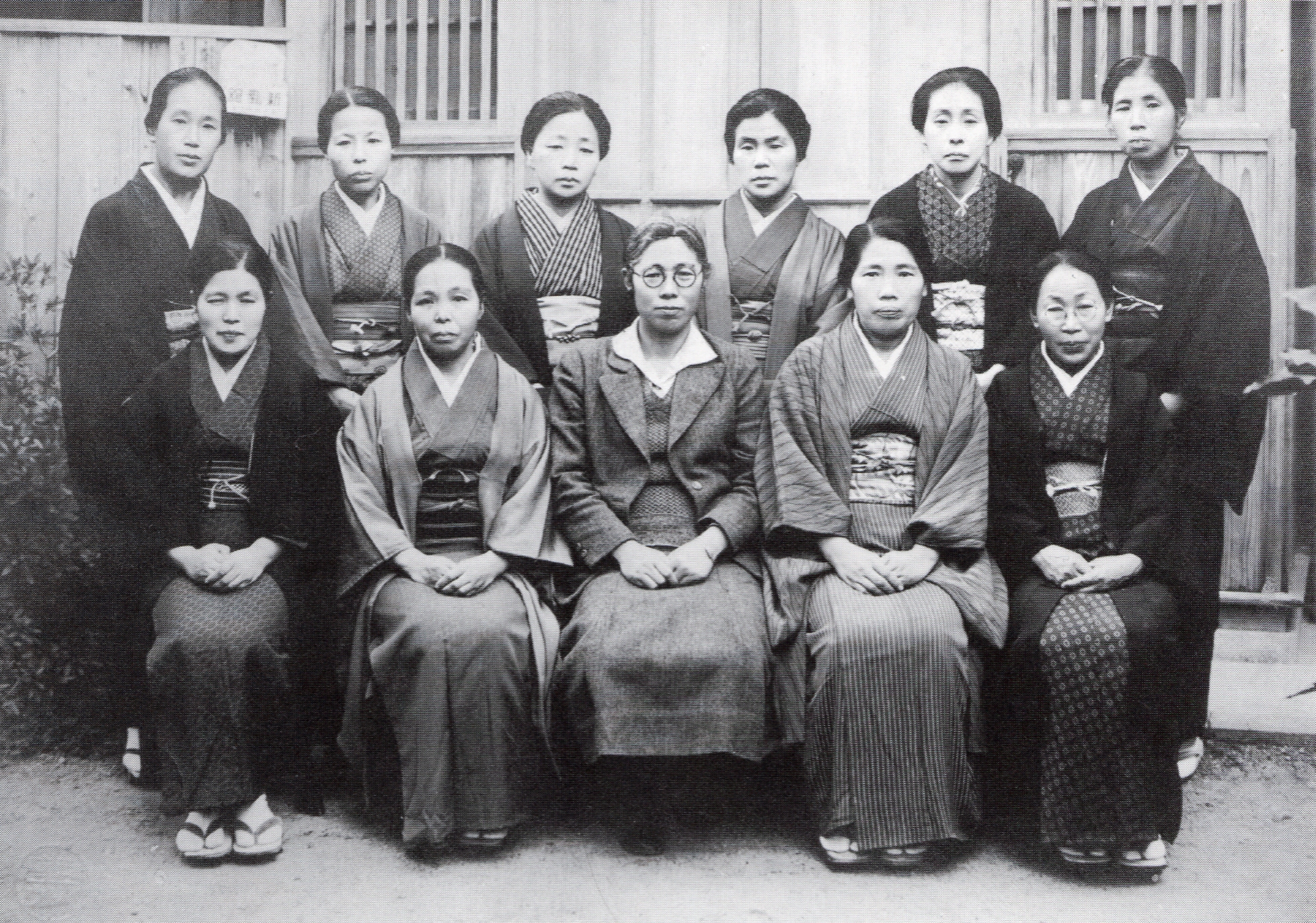
These roles, while undertaken with the aim of advancing women's position, aligned her with the wartime government's agenda and later drew significant criticism. For instance, in December 1943, she delivered a lecture in Kawaguchi Village, Minamitama District, Tokyo (now Hachioji City). In June 1944, she evacuated to Kawaguchi Village, where she and her adoptive daughter, Misao Mashita, began cultivating a 1066 ft2 (99 m2) plot of land, transforming a forest into a vegetable garden. Her actions during this period have been subject to historical scrutiny and evaluation, acknowledging the controversial nature of her engagement with wartime organizations and her alignment with the government's efforts during World War II.
4.3. Post-War Activism
Immediately after the war, on August 25, 1945, Ichikawa, along with Ochimi Kubushiro, Shigeri Yamataka, and Tsuneko Akamatsu, formed the "Post-War Measures Women's Committee" to continue demanding women's suffrage from the government and various political parties.
Her post-war activism also extended to advocating for social morality. On November 2, 1951, she established the "Council Against Revival of Prostitution System" (公娼制度復活反対協議会Kōshō Seido Fukkatsu Hantai KyōgikaiJapanese), spearheading the anti-prostitution movement. Furthermore, on December 19, 1951, she collaborated with Raicho Hiratsuka and Tano Kamidai to form the "Women's Committee Against Rearmament" (再軍備反対婦人委員会Sai-gunbi Hantai Fujin IinkaiJapanese), reflecting her commitment to peace.
Ichikawa remained a tireless champion of women's issues, consistently organizing and participating in women's conferences both within Japan and internationally. In 1980, she became a leading voice in urging the Japanese government to ratify the Convention on the Elimination of All Forms of Discrimination against Women (CEDAW), demonstrating her continued dedication to global gender equality. She also cooperated with the anti-Unification Church movement, joining the "Association to Worry About the Principle Movement" as a convener in 1978.
5. Political Career
Ichikawa Fusae's political career was marked by both significant achievements and periods of challenge, reflecting her steadfast commitment to democratic ideals and women's rights.
5.1. Public Office Purge and Return
Following World War II, Ichikawa was among those subjected to the public office purge implemented by the Allied occupation authorities. On March 24, 1947, she was excluded from political and governmental offices due to her role as a director of the Dai-Nippon Genron Hokokukai during the war. She holds the distinction of being the first woman to be purged from public office. This decision was justified by the GHQ with the argument that "duties and penalties are equal in a gender-equal world."
The purge was eventually lifted on October 13, 1950. Immediately upon her return to public life, on November 9, 1950, she resumed her role as president of the New Japan Women's League, which was subsequently renamed the Japan Women's Voters League (日本婦人有権者同盟Nippon Fujin Yūkensha DōmeiJapanese). This marked her swift return to active advocacy for women's rights.
5.2. Activities in the House of Councillors
On March 23, 1953, Ichikawa resigned as president of the Japan Women's Voters League. On April 24, 1953, she successfully ran as an independent candidate in the 3rd House of Councillors ordinary election from the Tokyo electoral district, securing her first term in the Diet. This marked the beginning of a remarkable political career spanning five terms in total, across both the Tokyo electoral district (where she served 1953-1971) and later the national constituency (1974-1981).
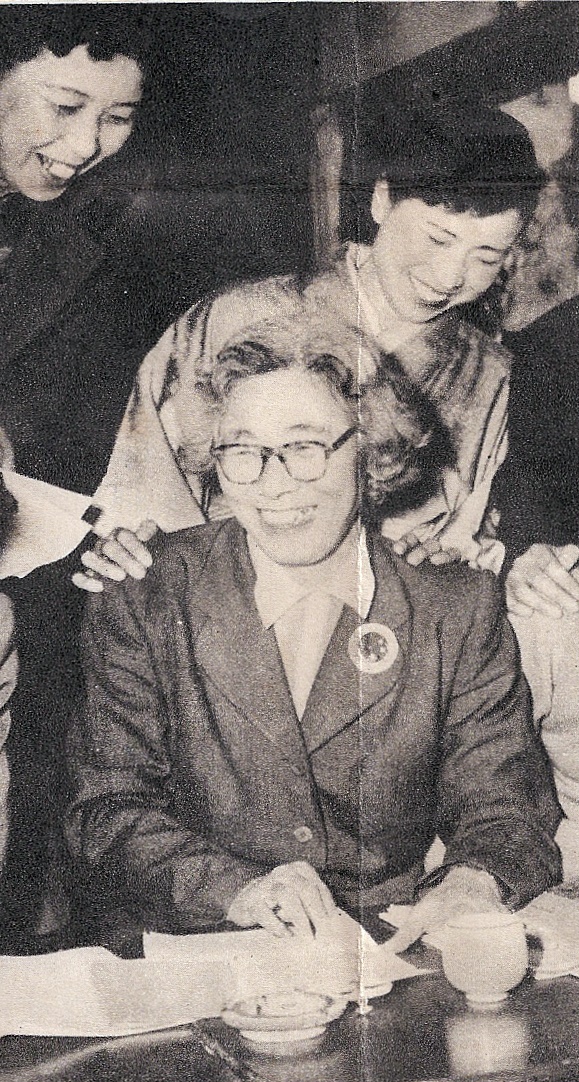
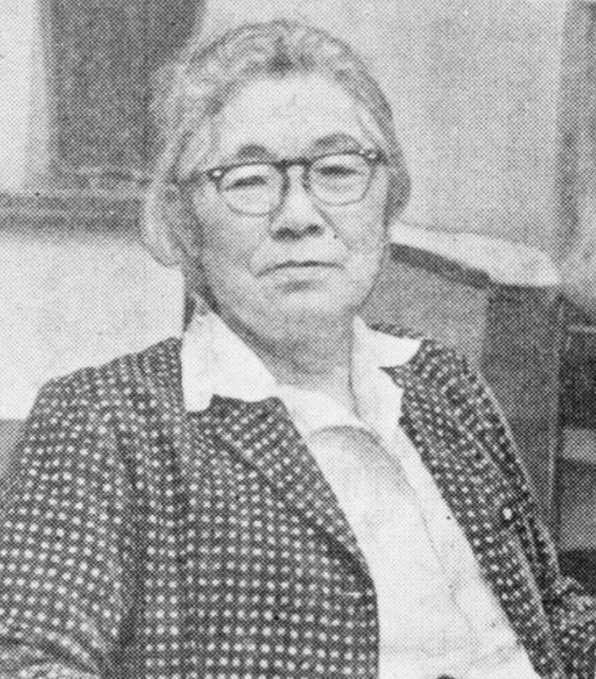
Ichikawa's campaigning style was unique, often referred to as an "ideal election." She largely eschewed reliance on political organizations and significant funding, instead relying on personal supporters who campaigned voluntarily. She actively promoted this low-cost election method to other candidates, believing it would foster cleaner politics. However, this approach faced criticism from some, such as Daizaburo Hashizume, who argued that it was only feasible for already well-known figures and thus not a viable systemic reform. Within the Diet, she never formally belonged to a political party, choosing instead to be part of the "Dainiin Club," a collective of independent members. Her legislative priorities consistently centered on women's issues and electoral reforms.
In July 1954, the Women's Problem Research Institute began publishing its professional journal, Fujinkai Tenbo (Trends in the Women's World). On October 2, 1962, the Women's Suffrage Hall in Shibuya, Yoyogi, became the "Women's Suffrage Hall Foundation," integrating with the Women's Problem Research Institute. The journal was then renamed Fujin Tenbo (Women's Outlook) starting from the January 1963 issue.
Ichikawa also collaborated with diverse figures on various issues. For instance, she supported Kanji Ishihara, a controversial figure, whom she regarded as a "person of integrity" and a "fine soldier." In 1963, she joined the "Drug Eradication and Land Purification Alliance," which involved cooperation with right-wing figures such as Seigen Tanaka, a former leader of the Yamaguchi-gumi yakuza organization, and novelist Sochihachi Yamaoka. On November 30, 1964, she joined ten other prominent women, including Michiko Ikeda, Fumie Ohara, Shikako Kaminchika, Tanie Kitabayashi, Fukiko Sayo, Harumi Setouchi, Tomoko Naraoka, Etsuko Miyake, and Shigeko Yuki, in appealing for a fair trial in the Tokushima Radio Store Murder Case, where Shigeo Fuji had been convicted.
In July 1965, she was re-elected for her third term in the 7th House of Councillors election. On October 15, 1965, during a ceremony commemorating 75 years of national suffrage, 40 years of universal suffrage, and 20 years of women's suffrage, Ichikawa received a special commendation for her contributions to women's suffrage. However, when she was informally offered the Order of the Sacred Treasure, Second Class, she immediately declined, consistent with her belief that conferring honors in a democracy was inappropriate as it "creates ranks among people." She similarly declined the Order of the Precious Crown, Second Class, in the spring of 1978.
On February 25, 1967, she publicly expressed her intention to resign as president of the Japan Women's Voters League to support Ryokichi Minobe, the joint candidate of the Japan Socialist Party and the Japanese Communist Party, in the 1967 Tokyo gubernatorial election. She became a representative of the "Association for a Bright Progressive Tokyo Metropolitan Government." In 1968, recognizing the need for Japanese women in international organizations, Ichikawa persuaded Sadako Ogata, then an international politics lecturer at International Christian University, to join Japan's delegation to the United Nations General Assembly. This proved to be a turning point, initiating Ogata's distinguished career at the UN.
In the July 1971 9th House of Councillors election, running from the Tokyo electoral district, Ichikawa lost her re-election bid, placing sixth. In 1972, regarding the Okinawa reversion secret agreement scandal, she, along with Takako Doi, Shizuko Sasaki, and Sumiko Tanaka of the Japan Socialist Party, formed the "Association to Consider Ms. Hasumi's Issue," focusing solely on the aspect of "collusion" rather than broader implications.
In February 1974, she initially declined requests to run in the House of Councillors election due to her age (81). However, following a passionate appeal from youth groups, she eventually accepted the nomination to run for the national constituency. Kan Naoto served as her election campaign manager during this period. On July 7, 1974, Ichikawa was re-elected for her fourth term in the 10th House of Councillors ordinary election. That same year, fashion designer Issey Miyake gifted her clothes, and a photo of Ichikawa wearing them by Kishin Shinoyama graced the cover of Asahi Graph magazine, sparking wide discussion. On November 22, 1975, she chaired the "International Women's Year Japan Convention," held at Kyoritsu Kodo with 41 women's organizations. She also chaired the "Liaison Council for the Implementation of Resolutions of the International Women's Year Japan Convention" (now the International Women's Year Liaison Group).
In 1979, at the age of 86, Ichikawa was ranked first in a Croissant magazine poll for readers' favorite "female face," garnering more than double the votes of second-place Momoe Yamaguchi. She famously stated that she "never used makeup, only applied cream after a bath." In the June 1980 12th House of Councillors ordinary election (a double election with the House of Representatives), at the age of 87, she achieved the highest number of votes in the national constituency, further cementing her enduring popularity and influence. She was also the oldest member of the House of Councillors from 1977 until her death in 1981.
6. Philosophy and Ideology
Ichikawa Fusae's core philosophy was deeply rooted in the principles of democracy, human rights, and gender equality. She believed that genuine democracy could not exist without the full participation and empowerment of women, and this conviction guided her lifelong activism and political endeavors.
She consistently argued that the political enfranchisement of women was not merely a matter of fairness but a crucial safeguard against societal ills, even asserting that women's political power might have prevented Japan's catastrophic entry into World War II. Her advocacy for "ideal elections," characterized by minimal reliance on funding and organizational structures, underscored her belief in transparent and grassroots-driven political processes. This approach was not just a strategy but a reflection of her commitment to purifying politics from corruption and making it accessible to all citizens.
Ichikawa's refusal of national honors, such as the Order of the Sacred Treasure, further highlighted her anti-hierarchical stance and her belief that true democratic values should not be expressed through systems that "create ranks among people." She saw such distinctions as antithetical to the principle of equality. Beyond suffrage, her work extended to broader social reforms, including opposition to prostitution and rearmament, and her tireless promotion of the Convention on the Elimination of All Forms of Discrimination against Women (CEDAW) demonstrated her commitment to a comprehensive vision of human rights and gender equality on both national and international stages. Her life exemplified a persistent struggle for a society where human dignity and democratic values would prevail for all.
7. Awards and Recognition
Ichikawa Fusae received significant accolades throughout her life for her dedication to social equality and women's rights.
In 1974, she was awarded the Ramon Magsaysay Award for Community Leadership, a prestigious honor recognizing her tireless efforts in promoting social equality. Her birthplace, Bisai City, bestowed upon her the title of honorary citizen; after Bisai merged with Ichinomiya City, she became an honorary citizen of Ichinomiya City.
Her enduring popularity and influence were also evident in public opinion. In a 2000 reader poll conducted by the Asahi Shimbun, asking readers to name their favorite political leader from 1000 to 1999 CE, Ichikawa ranked 9th with 230 votes, making her the only woman to appear in the top 10. Additionally, from 1977 until her death in 1981, she held the distinction of being the oldest member of the House of Councillors of Japan.
8. Personal Life
Ichikawa Fusae maintained a focused personal life, primarily dedicated to her public mission. She adopted Misao Mashita, a farmer's daughter from Toyama Prefecture, who began working as her live-in assistant at the age of 16 in June 1942. Misao Mashita was formally adopted by Ichikawa on August 20, 1949, changing her surname to Ichikawa.
Ichikawa was known for her unpretentious public persona. In a 1979 interview with Croissant magazine, where she was ranked the most popular "female face" by readers, she famously stated, "I've never worn makeup. After a bath, my skin gets dry, so I put on some cream, that's about as much makeup as I do." This comment further highlighted her dedication to her work over personal vanity.
9. Death and Legacy
Ichikawa Fusae's passing marked the end of an era for women's rights and democratic advocacy in Japan, but her legacy continues to influence society.
9.1. Death
On January 16, 1981, Ichikawa was admitted to the Japanese Red Cross Medical Center in Shibuya, Tokyo, after complaining of chest pain. She remained under medical care until her death on February 11, 1981, at 7:13 AM, due to myocardial infarction (heart attack). She was 87 years old. Her grave is located at Fuji Cemetery.
Immediately following her death, the House of Councillors formally recognized her contributions. On February 13, two days after her passing, the Speaker of the House of Councillors delivered a memorial address and honored her with the "Permanent Member of the House of Councillors" award. On February 27, a eulogy for Ichikawa was delivered by Shigeru Ishimoto during a plenary session of the House of Councillors. Her hometown, Bisai City, also named her an honorary citizen; this honor was later transferred to Ichinomiya City following a merger.
9.2. Posthumous Influence and Memorials
Ichikawa's impact continued to be felt after her death. In 1981, the documentary film The Eighty-Seven-Year-Old Youth - Fusae Ichikawa's Life Story, directed and written by Eiji Murayama, was released, chronicling her life and activism.
On November 15, 1983, the Women's Suffrage Hall, which Ichikawa founded, underwent extensive renovation and expansion. A "Fusae Ichikawa Memorial Exhibition Room" was established on the second floor of the building. On the same day, the Women's Suffrage Hall Foundation was renamed the "Fusae Ichikawa Memorial Association" (市川房枝記念会Ichikawa Fusae KinenkaiJapanese). In 2009, this foundation was further renamed the "Fusae Ichikawa Memorial Association Center for Women and Governance" (公益財団法人市川房枝記念会女性と政治センターKōeki Zaidan Hōjin Ichikawa Fusae Kinenkai Josei to Seiji SentāJapanese), and it transitioned to a public interest foundation on April 1, 2013, continuing her work in promoting women's political participation and gender equality.
The activities of the Japan Women's Voters League were largely carried forward by Teiko Kihira, who served as Ichikawa's secretary and later became a member of the House of Councillors. However, due to an aging and declining membership, the League ultimately dissolved in April 2016.
The National Diet Library holds a significant resource in Ichikawa's "Political Discourse Recordings," a comprehensive seven-hour interview recorded in March and May 1978. Initially planned for public release 30 years later, in 2008, it was made accessible earlier due to demand from organizations like the Ichikawa Fusae Memorial Association, providing invaluable insights into her thoughts on politics and women's enfranchisement.
10. Writings
Ichikawa Fusae was a prolific writer, contributing numerous publications that reflected her feminist ideals, political philosophy, and observations on society. Her major works include:
- Senshi Fujin Tokuhon (Wartime Women's Reader), Showa Shobo, 1943.
- Fujinkai no Doko (Trends in the Women's World), Bunshodo Shuppan, 1944. (Later re-titled Sengo Fujinkai no Doko: Fujin no Minshuka o Chushin to shite [Trends in the Post-War Women's World: Focusing on the Democratization of Women], Fusen Kaikan Shuppanbu, 1969).
- Fujin Komin Kyoiku Mondai (Problems of Women's Civic Education), Insatsukyoku, 1946.
- Atarashiki Seiji to Fujin no Kadai (New Politics and Women's Challenges), Insatsukyoku, 1946.
- Fusen Undo Kaiko (Recollection of the Women's Suffrage Movement), Fujin Mondai Kenkyusho, 1955.
- Zen Nihon Fujin Giin Taikai Gijiroku: Fujin Sansei Jusshunen Kinen (Minutes of the All Japan Women Legislators' Conference: Commemorating the 10th Anniversary of Women's Suffrage), Fujin Sansei Jusshunen Kinen Gyoji Jikko Iinkai Zanmu Seiri Iinkai, 1956.
- Fujin Sansei Jusshunen Kinen Gyoji Jikko Iinkai Kiroku: Fu Fujin Sansei Kankei Shiryo (Records of the 10th Anniversary of Women's Suffrage Commemoration Event Executive Committee: Attached Materials on Women's Suffrage), Fujin Sansei Jusshunen Kinen Gyoji Jikko Iinkai Zanmu Seiri Iinkai, 1959.
- 37·7·1 no Sangiin Giin Senkyo no Hiyo to 37nen no Seito-to no Seiji Shikin to Kaisha no Seiji Kenkin: Ichikawa Fusae Chosa (Election Expenses for the House of Councillors Election on July 1, 1962, and Political Funds of Parties and Corporate Political Donations in 1962: A Survey by Fusae Ichikawa), Riso Senkyo Fukyu-kai, 1965.
- Watashi no Fujin Undo (My Women's Movement), Akimoto Shobo, 1972.
- Watashi no Seiji Shorom (My Political Essays), Akimoto Shobo, 1972.
- Ichikawa Fusae Jiden: Senzenhen (Autobiography of Fusae Ichikawa: Pre-War Volume), Shinjuku Shobo, 1974.
- Watashi no Iitai Koto: Seiji to Kurashi o Kangaeru (What I Want to Say: Thinking About Politics and Life), Poplar Publishing, 1976.
- Seiji (Politics), Domesu Shuppan, 1977.
- Jinken (Human Rights), Domesu Shuppan, 1978.
- Daikon no Hana (Radish Flowers), Shinjuku Shobo, 1979.
- Stop The Corrupt Diet Members!: Shimin Undo no Kiroku (Stop the Corrupt Diet Members!: A Record of Citizen Movements), Shinjuku Shobo, 1980.
- Nonaka no Ipponsugi (A Lone Cedar in a Field), Shinjuku Shobo, 1981.
- Ichikawa Fusae no Kokkai Zen Hatsugen Shu: Sangiin Kaigiroku yori Sairoku (Collected Diet Statements of Fusae Ichikawa: From the House of Councillors Minutes), Ichikawa Fusae Kinenkai Shuppanbu, 1992.
- Watashi no Kokkai Hokoku (My Diet Report), Ichikawa Fusae Kinenkai Shuppanbu, 1992. (Reprint of pamphlets from 1953-1981).
- Fusen: Fusen Kakutoku Domei Kikan-shi (Women's Suffrage: Official Organ of the Women's Suffrage League), Fushi Shuppan, 1992. (Reprint of the original journal Josei Tenbo).
11. Related Persons
Several key individuals were closely associated with or influenced by Ichikawa Fusae, collaborating with her in various capacities throughout her career:
- Naoto Kan: Served as Ichikawa's election campaign manager during her 1974 House of Councillors election campaign. He later became a prominent politician, serving as Prime Minister.
- Hitoshi Tanoue: Was part of Ichikawa's election staff in the 1974 House of Councillors election. He later became a candidate for the Social Democratic Federation.
- Nobuyoshi Kasai: Served as one of Ichikawa's official secretaries. He later became a four-term member of the Komae City Council for the Japan Socialist Party and then a Democratic Party member of the Tokyo Metropolitan Assembly in 2001.
- Teiko Kihira: Began her career as Ichikawa's secretary. Although she ran for the House of Councillors from the Tokyo electoral district in 1974 with the recommendation of the "Citizens' Association for the Promotion of Ideal Elections" but lost, she was later successfully elected to the House of Councillors from the Kumamoto electoral district in 1989. She inherited the activities of the Japan Women's Voters League from Ichikawa.